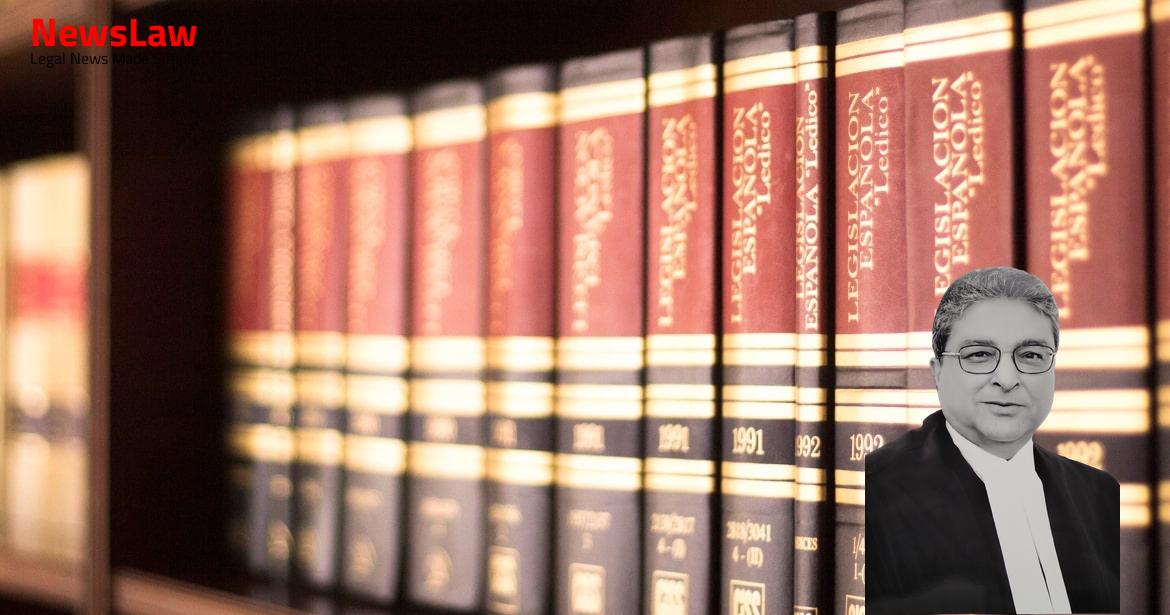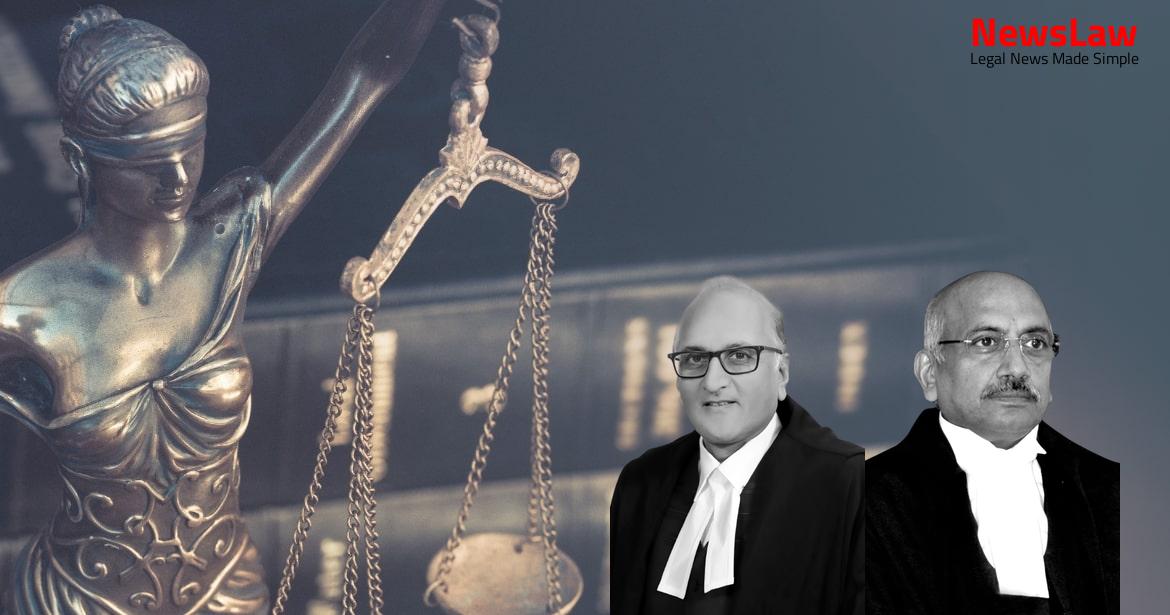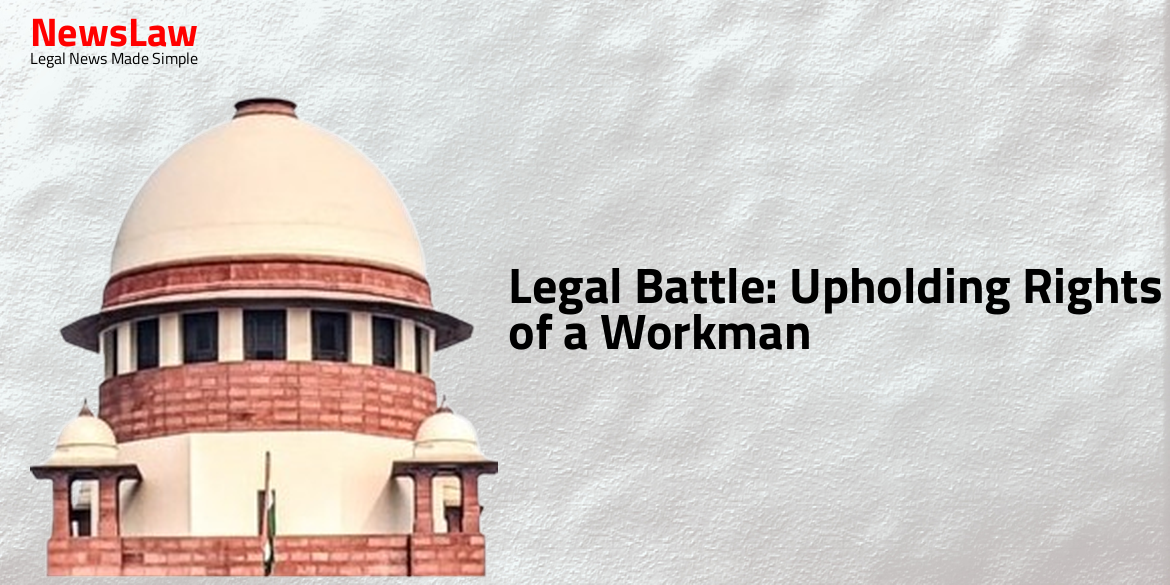Explore a comprehensive legal analysis of the validity of a compromise decree in a property dispute case. The Court’s in-depth consideration of contract law principles and dispute resolution mechanisms provides valuable insights into the nuances of litigation. This summary focuses on the legal aspects of the case, highlighting the importance of understanding the implications of compromise decrees in property disputes.
Facts
- The High Court observed the point for determination in the appeal regarding whether O.S.No.1101 of 1987 is maintainable under Order XXIII Rule 3A of the CPC.
- Extensive arguments were made by respective counsel, but no other point for consideration was formulated by the High Court.
- The appeals could be disposed of based on the findings regarding the validity of the decree passed in O.S.No.37 of 1984.
- The compromise decree dated 06.08.1984 in Suit No.37 of 1984 was found to be valid by the High Court.
- The High Court concluded that the plaintiff failed to prove any fraud or guarantee related to the compromise decree.
- The plaintiff’s claim about giving a personal guarantee for a loan in 1984 was refuted as not being proven.
- Properties inherited by Janakiammal were not allocated to her in the compromise decree, except for shares in Vasudeva Mills.
- The High Court addressed various allegations and claims made by the parties regarding joint family properties, agreements, and partition deeds.
- The trial court upheld the partition deed dated 07.11.1960 and the agreement dated 08.03.1981.
- Two appeals were filed against the High Court’s judgment which dismissed them.
- The High Court held that the suit was barred by Order XXIII Rule 3A CPC.
- The only remedy suggested was to question the compromise decree in the same suit.
- The High Court did not consider the case of 20 Janakiammal as pleaded.
- The trial court found that after 1960, the family was no longer living jointly and branches were co-owners involved in partnership businesses.
- Two appeals were filed challenging the trial court’s judgment that dismissed the suit.
- The trial court upheld the defendants’ plea that the suit was barred by Order XXIII Rule 3A CPC.
Issue
- The issue at hand is whether the grounds to impeach the compromise deed in Suit No. 1101 of 1987 are valid and can be raised before the Court recording the compromise decree as per Rule 3 of Order XXIII.
Arguments
- Plaintiff filed suit No.1101 of 1987 to declare the decree dated 06.08.1984 void, unenforceable, and fraudulent.
- The plaintiff was misled into signing the compromise application in 1984 by D-1, who assured that his rights in immovable property would not be affected.
- The allocation of properties in the compromise decree was deemed unfair and obtained through fraud on the plaintiff and the court.
- The plaintiff argues that Order XXIII Rule 3A does not apply when fraud is involved.
- The High Court found the suit to be under Order XXIII Rule 3A but did not explore other issues.
- Suit for share in house property at Tatabad was considered maintainable as it was not included in the previous suit.
- The plaintiff did not engage any counsel and believed there was no joint family property.
- The appropriate remedy for the plaintiff was deemed to be filing an application in the previous suit or appealing against the compromise decree.
- The defendant No.1 managed the mill until 1989 and then resigned.
- The partition dated 07.11.1960 between three branches was noted and income tax returns were filed based on this partition.
- Signatures of Janakiammal were taken on compromise application by D-2, wife of D-1, for business and tax purposes.
- Certified copy of Vakalatnama filed by advocate Thirumalnesan on behalf of defendant Nos. 8 to 13 has not been brought on record.
- The house at Tatabad, purchased from a joint family fund, had contributions from Swamy and Swamy Plantations, a private limited company.
- The compromise decree dated 06.08.1984 was acted upon regarding the Tatabad house shares.
- The suit filed by the plaintiff was based on the claim that she did not know English and the compromise was in English, which was refuted by the family’s various businesses’ operations.
- Partition dated 07.11.1960 was entered between three brothers to save the landed property from the Land Ceiling Act.
- Janakiammal stated that she never engaged any advocate, contradicting the claims of the defendant’s side.
Analysis
- Defendant No.1 claimed that Suit No.1101 of 1987 was barred under Order XXIII Rule 3A due to the compromise decree being void or voidable.
- The defendant asserted that the ancestral house was at Sedapalayam and a new house was constructed at Somanur for the Joint Family.
- The defendant claimed that a partition deed was executed in 1960 to avoid Land Ceiling Act implications.
- The concept of reunion in Hindu Law was discussed, where evidence of jointness post-partition indicated a continuation of joint family status.
- The plaintiff challenged the compromise decree of 1984, but the courts determined it to be lawful and not open to separate suit.
- Evidence showed property transactions, joint businesses, and family arrangements indicating ongoing joint family involvement post-partition.
- The defendant’s assertion of a partition in 1981 was refuted by lack of evidence and plaintiff’s denial.
- The plaintiff’s prayer to declare the 1984 decree unenforceable did not extend to properties not included in the decree, like the Tatabad house.
- The significance of the compromise being lawful and not void or voidable under the Contract Act was emphasized.
- A consent decree operates as an estoppel and can only be set aside by the court that passed it.
- Consent in a contract must be free and not caused by coercion, undue influence, fraud, misrepresentation, or mistake as per Section 14 of the Indian Contract Act.
- An agreement or compromise that is void or voidable under the Indian Contract Act shall not be deemed lawful under Rule 3 of Order XXIII.
- Rule 3 of Order XXIII requires a lawful agreement or compromise to be in writing and signed by the parties.
- If consent in a contract is caused by coercion, fraud, or misrepresentation, the agreement becomes voidable at the option of the party whose consent was affected.
- Rule 3A added by an amendment prohibits a suit to set aside a decree based on a compromise that was not lawful.
- The legislative policy aims to provide a mechanism for dispute resolution to restore peace in society and give finality to litigation.
- In accordance with the proviso to Order 23 Rule 3, if one party alleges adjustment or satisfaction of a suit by a lawful agreement or compromise, and the other party denies it, the court must decide the matter.
- Reunion among brothers after partition can only occur through specific intentions and actions, not merely by joint residence, food, worship, or trading together.
- Reunion requires an unequivocal intention of the parties to reunite in estate and interest, and this intent can be implied from their conduct.
- Challenging a consent decree should be done in the court where the compromise was recorded, not through a separate suit, as per Order 23 Rule 3A.
- Reunion involves an agreement to revert to the former status of a joint Hindu family with shared wealth and interests.
- The burden of proof for asserting reunion lies heavily on the party making the claim, and ambiguous conduct cannot sustain a plea of reunion.
Decision
- All three branches equally share the Tatabad residential property.
- The residential property is not a part of O.S.No.37 of 1984.
- Plaintiff/defendant No.7, defendant No.1, and defendant No.4 are entitled to 1/3 share each in the property.
- Parties can apply for a final decree before the trial court.
- Civil Appeal No.1537 of 2016 and Civil Appeal No.1538 of 2016 are partly allowed.
- Original Suit No.1101 of 1987 is decreed for partition of the specific property in Coimbatore.
Case Title: R.JANKIAMMAL Vs. S.K.KUMARASWAMY (D) THR.LRS. (2021 INSC 316)
Case Number: C.A. No.-001537-001537 / 2016



